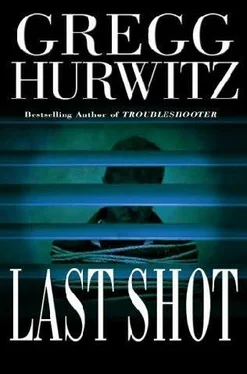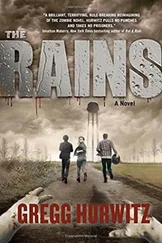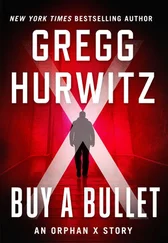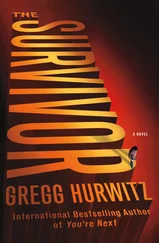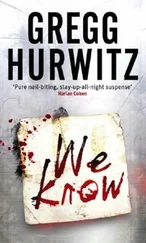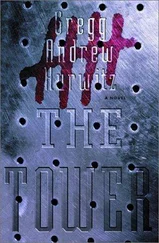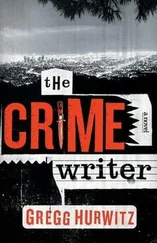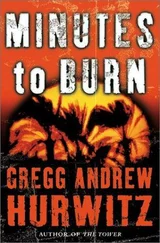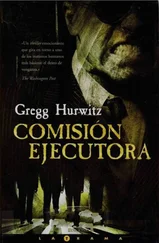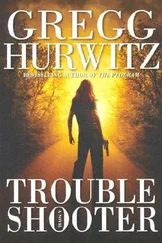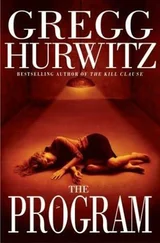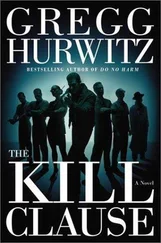Gregg Hurwitz - Last shot
Здесь есть возможность читать онлайн «Gregg Hurwitz - Last shot» весь текст электронной книги совершенно бесплатно (целиком полную версию без сокращений). В некоторых случаях можно слушать аудио, скачать через торрент в формате fb2 и присутствует краткое содержание. Жанр: Триллер, на английском языке. Описание произведения, (предисловие) а так же отзывы посетителей доступны на портале библиотеки ЛибКат.
- Название:Last shot
- Автор:
- Жанр:
- Год:неизвестен
- ISBN:нет данных
- Рейтинг книги:3 / 5. Голосов: 1
-
Избранное:Добавить в избранное
- Отзывы:
-
Ваша оценка:
- 60
- 1
- 2
- 3
- 4
- 5
Last shot: краткое содержание, описание и аннотация
Предлагаем к чтению аннотацию, описание, краткое содержание или предисловие (зависит от того, что написал сам автор книги «Last shot»). Если вы не нашли необходимую информацию о книге — напишите в комментариях, мы постараемся отыскать её.
Last shot — читать онлайн бесплатно полную книгу (весь текст) целиком
Ниже представлен текст книги, разбитый по страницам. Система сохранения места последней прочитанной страницы, позволяет с удобством читать онлайн бесплатно книгу «Last shot», без необходимости каждый раз заново искать на чём Вы остановились. Поставьте закладку, и сможете в любой момент перейти на страницу, на которой закончили чтение.
Интервал:
Закладка:
Walker scanned back over the preceding months. Vector was listed in March and April, often several times in a given week. Staring at the company name rendered again and again in Tess's neat hand, he felt his curiosity sharpen.
Chapter 15
Dolan cracked his knuckles for the third time that morning, psyching himself up for the confrontation he'd been rehearsing in his head since he woke up. A glance around the lab and his anxiety gave way momentarily to pride at all his work had given rise to.
He'd stumbled into the field, awed by the progress made by those scientist-pioneers who'd come before him. They'd made a brilliant leap. An imaginative leap. Brilliant and imaginative the way that Darwin's mechanism for evolution had been-simple and sound. Once you got it, it was all but obvious. All the pieces had been there; it was just a matter of assembling them to form the right picture. And unlike natural selection, viral vectors could be tested over weeks, not eons.
Gene therapy arose to correct genetic disorders that were deemed incurable. The bench work, while complex, was straightforward. Take a virus, designed through natural selection to penetrate human tissue, and excise the DNA sequences that make it virulent. Once it's been defanged and declawed, what remains is a biological vehicle with plenty of cargo room-a microscopic Trojan horse. Insert a therapeutic gene and the formerly threatening virus acts as benign transport. Once the viral vector is introduced into a subject, it finds its way to the target DNA sequence on the appropriate chromosome and the transgene insinuates itself, replacing the faulty gene.
Dolan had always been taken not just with the medical ramifications of viral vectors but with the elegance of the mechanics. And over the past few years, under the auspices of his own Vector Biogenics, he'd made not one but two breakthrough contributions to the field. They had come in relation to alpha-1 antitrypsin deficiency, an obvious disorder to tackle, since all its complications arise from a single set of faulty genes. Other grails were out there, sure, cystic fibrosis, maybe even familial hypercholesterolemia after that, but for now his (and Vector's) hopes hung on perfecting a viral vector that could deliver a gene to correct AAT deficiency. A dire disorder, usually diagnosed in childhood. Instead of producing a protein that helps coat and protect the lungs, the liver of an afflicted patient generates an abnormal enzyme that accumulates inside the liver and eventually shuts it down.
Dolan had chosen lentivirus and smallpox for his development models because they were nice roomy viruses, Mack trucks to the Mini Cooper of the more experimentally plumbed adenovirus. His first landmark vector-and still his pet project-had been born in relatively short order.
Lentidra.
The lentivirus vector (the latest model was code-named L12-AAT) had been his favorite from the gates because it seemed consistently to provide permanent integration of the transgene into the genome-one shot and the subject was cured. Optimistic from all theoretical indications, he'd handed over his creation to the study director who would conduct animal trials. But Lentidra's preclinical studies were abruptly suspended, after initial reports had come back riddled with problems. After this first, failed model, Dolan had to set his sights lower, temporarily relinquishing the dream of long-term gene expression and, at the board's urging, turning his focus to his redheaded stepchild, the smallpox vector (now known as X5-AAT and by its more marketable title, Xedral).
Rather than integrating into the host's genome, Xedral allowed only for short-term gene expression; the DNA floated in the nuclei of the target cells, got expressed briefly, then faded. The treatment was effective-86 percent effective from trial indications-but not a cure, and it required a booster shot once a month for maintenance. Otherwise the subject would slide back into his failing condition. In animal studies, Xedral was looking to be safer than Lentidra and more effective. These trials showed a stability of transgene expression sufficient to bring Vector to the verge of FDA Phase I human studies. A number of volunteers, mostly children, would begin trials within the month.
Dolan still mourned the loss of Lentidra. The idea of cure was tantalizing. Next to prevention, it was the best thing a medical scientist could deliver.
In fact, the notion of long-term transgene expression was what had sparked Dolan's interest in the field. When, while coasting through UCLA as a biochemistry major, he'd first learned of the huge advances scientists were making using viruses to shuttle genes, he'd been possessed intellectually. Casting aside a (lukewarm) aspiration for medical school, he'd dived into research, fretting over mitochondrial-derived activators for a promising but uninspired senior thesis. He'd stayed in the department for a Ph. D., blissfully engaged in his research. He loved playing detective, tugging at analytical knots, plank-walking out to areas of specialization where he alone could generate answers to the questions he was posing. And, better yet, he was gifted at it, his dissertation work knocking the experimental frontier forward a longitude or two.
Dolan's thoughts returned to the concern at hand, and he leaned forward, resting his elbows on his workstation. For all its sloppiness, his bench was organized precisely to his liking. It was the one place he felt at home. His machine-sharpened Faber-Castell number-twos, his DNA samples, his microfuge tubes.
When he strayed beyond his bench, however, the particulars of ownership became a bit hazier. Beacon-Kagan, the pharmaceutical behemoth that was Vector's parent company, brought its influence to bear in imaginative and indirect fashion. Ostensibly, Vector had its own management, but it was a wholly owned subsidiary with plenty of Beacon-Kagan executives on loan and more cross-board memberships than would have been orthodox a few presidential administrations ago. In return for these unnegotiated concessions, Dolan, as the principal investigator and senior scientist, enjoyed a relative freedom from budgets and business concerns. He mostly kept to his domain, what others called research but he always called science, constructing his viral vectors in his sheltered corner of the lab.
Having assumed the lease at the board's insistence from a failing digital-TV company, Vector occupied the ground floor of the twenty-six-story Beacon-Kagan building in Westwood, located just below UCLA on Wilshire. In his private moments, which were many at work and few at home, Dolan likened Beacon-Kagan to a twenty-five-story ogre perched on his shoulders. But what a rich infrastructure for Vector to flourish in. And flourish it had-thanks to Xedral-to the brink of a closely watched IPO. Watched from the Street and from above.
Dolan pivoted now in his barstool-height architect's chair, working up the nerve to confront the board's pet study director (in title at least, Dolan's employee) about the aborted Lentidra trials. Casting nervous glances across the lab through the two glass walls into the test-subject suite, he waited for Huang's head of shiny black hair to appear. It was early-6:00 A.M. early. Any Beacon-Kagan employees (and that meant any Vector employees) who didn't want to wither in the corporate culture started their days before their days.
Huang finally swept into view, wearing his knapsack, an accessory-like the Trek twenty-one-speed he "commuted" on-that Dolan had always thought an affectation of youthfulness. Dumping the knapsack onto his desk, Huang tugged his lab coat from his chair back and slipped into it, completing his transformation into authority figure. Sipping a Starbucks, he pulled himself to his monitor.
Dolan stood, trying to override unease with indignation. Why shouldn't he confront Huang? After all, wasn't it Dolan's company? Vector Biogenics wouldn't exist were it not for him. As the father of the process and the senior scientist, wasn't he entitled to a few simple information requests?
Читать дальшеИнтервал:
Закладка:
Похожие книги на «Last shot»
Представляем Вашему вниманию похожие книги на «Last shot» списком для выбора. Мы отобрали схожую по названию и смыслу литературу в надежде предоставить читателям больше вариантов отыскать новые, интересные, ещё непрочитанные произведения.
Обсуждение, отзывы о книге «Last shot» и просто собственные мнения читателей. Оставьте ваши комментарии, напишите, что Вы думаете о произведении, его смысле или главных героях. Укажите что конкретно понравилось, а что нет, и почему Вы так считаете.
